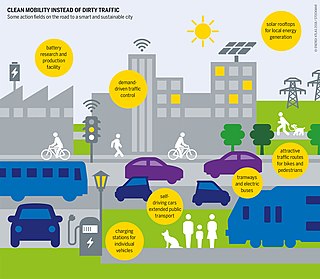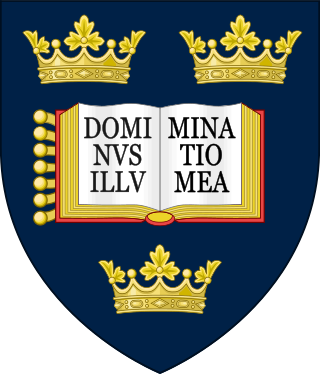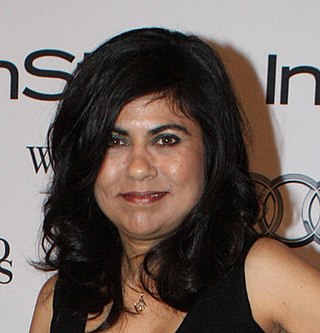
Innovation is the practical implementation of ideas that result in the introduction of new goods or services or improvement in offering goods or services. ISO TC 279 in the standard ISO 56000:2020 defines innovation as "a new or changed entity, realizing or redistributing value". Others have different definitions; a common element in the definitions is a focus on newness, improvement, and spread of ideas or technologies.
The Fraunhofer Society is a German publicly-owned research organization with 76 institutes spread throughout Germany, each focusing on different fields of applied science. With some 30,800 employees, mainly scientists and engineers, and with an annual research budget of about €3.0 billion, it is the biggest organization for applied research and development services in Europe. It is named after Joseph von Fraunhofer who, as a scientist, an engineer, and an entrepreneur, is said to have superbly exemplified the goals of the society.

Research and development, known in some countries as experiment and design, is the set of innovative activities undertaken by corporations or governments in developing new services or products. R&D constitutes the first stage of development of a potential new service or the production process.

Health care, or healthcare, is the improvement of health via the prevention, diagnosis, treatment, amelioration or cure of disease, illness, injury, and other physical and mental impairments in people. Health care is delivered by health professionals and allied health fields. Medicine, dentistry, pharmacy, midwifery, nursing, optometry, audiology, psychology, occupational therapy, physical therapy, athletic training, and other health professions all constitute health care. The term includes work done in providing primary care, secondary care, tertiary care, and public health.
Technology transfer (TT), also called transfer of technology (TOT), is the process of transferring (disseminating) technology from the person or organization that owns or holds it to another person or organization, in an attempt to transform inventions and scientific outcomes into new products and services that benefit society. Technology transfer is closely related to knowledge transfer.
Openness is an overarching concept that is characterized by an emphasis on transparency and collaboration. That is, openness refers to "accessibility of knowledge, technology and other resources; the transparency of action; the permeability of organisational structures; and the inclusiveness of participation". Openness can be said to be the opposite of closedness, central authority and secrecy.
The Framework Programmes for Research and Technological Development, also called Framework Programmes or abbreviated FP1 to FP9, are funding programmes created by the European Union/European Commission to support and foster research in the European Research Area (ERA). Starting in 2014, the funding programmes were named Horizon.
Science Week refers to series of science-related events for the general public which are held in a specific countries during a designated week of the year. The aim of such science weeks is to engage and inspire people of all ages with science, engineering and technology.
Excel Central School is a co-educational English Medium School which is situated 1 km west to Thiruvattar in Kanyakumari district of Tamil Nadu. It follows the Council for the Indian School Certificate Examinations, CISCE board, and is branded along with Excel Global School as the Excel Group of Schools. The Administration of the school is vested with the Centre for Educare and Research Charitable Trust, which is a non-profit organisation for rural education.

A smart city is an urban area that uses digital technology to collect data and to operate/provide services. Data can be collected from citizens, devices, buildings, or cameras. Applications include traffic and transportation systems, power plants, utilities, urban forestry, water supply networks, waste disposal, criminal investigations, information systems, schools, libraries, hospitals, and other community services. The foundation of a smart city is built on the integration of people, technology, and processes, which connect and interact across sectors such as healthcare, transportation, education, and infrastructure, etc. Smart cities are characterized by the ways in which their local governments monitor, analyze, plan, and govern the city. In a smart city, the sharing of data extends to businesses, citizens and other third parties who can derive benefit from using that data. The three largest sources of spending associated with smart cities as of 2022 were visual surveillance, public transit, and outdoor lighting.

Research and development intensity is generally defined as expenditures by a firm on its research and development (R&D) divided by the firm's sales. There are two types of R&D intensity: direct and indirect. R&D intensity varies, in general, according to a firm's industry sector, product knowledge, manufacturing, and technology, and is a metric that can be used to gauge the level of a company's investment to spur innovation in and through basic and applied research. A further aim of R&D spending, ultimately, is to increase productivity as well as an organization's salable output.

Free content, libre content, libre information, or free information is any kind of creative work, such as a work of art, a book, a software program, or any other creative content for which there are very minimal copyright and other legal limitations on usage, modification and distribution. These are works or expressions which can be freely studied, applied, copied and modified by anyone for any purpose including, in some cases, commercial purposes. Free content encompasses all works in the public domain and also those copyrighted works whose licenses honor and uphold the definition of free cultural work.

Oxford University Innovation Limited (OUI) is a British technology transfer and consultancy company created to manage the research and development (R&D) of university spin-offs. OUI is a wholly owned subsidiary of the University of Oxford, and is located on Botley Road, Oxford, England. OUI was previously known as Isis Innovation (1988–2016) and Oxford University Research and Development Ltd (1987–1988).

The National Library of Economics is the world's largest research infrastructure for economic literature, online as well as offline. The ZBW is a member of the Leibniz Association and has been a foundation under public law since 2007. Several times the ZBW received the international LIBER Award for its innovative work in librarianship. The ZBW allows for access of millions of documents and research on economics, partnering with over 40 research institutions to create a connective Open Access portal and social web of research. Through its EconStor and EconBiz, researchers and students have accessed millions of datasets and thousands of articles. The ZBW also edits two journals: Wirtschaftsdienst and Intereconomics.

The Ministry of Education (MoE) is a ministry of the Government of India, responsible for the implementation of the National Policy on Education. The ministry is further divided into two departments: the Department of School Education and Literacy, which deals with primary, secondary and higher secondary education, adult education and literacy, and the Department of Higher Education, which deals with university level education, technical education, scholarships, etc.
Basic research, also called pure research, fundamental research, basic science, or pure science, is a type of scientific research with the aim of improving scientific theories for better understanding and prediction of natural or other phenomena. In contrast, applied research uses scientific theories to develop technology or techniques, which can be used to intervene and alter natural or other phenomena. Though often driven simply by curiosity, basic research often fuels the technological innovations of applied science. The two aims are often practiced simultaneously in coordinated research and development.

Veena Sahajwalla is an Indian-Australian inventor who is Professor of Materials Science in the Faculty of Science at UNSW Australia. She is the Director of the UNSW SM@RT Centre for Sustainable Materials Research and Technology and an Australian Research Council Laureate Fellow.
OpenAthens is an identity and access management service, supplied by Jisc, a British not-for-profit information technology services company. Identity provider (IdP) organisations can keep usernames in the cloud, locally or both. Integration with ADFS, LDAP or SAML is supported.

Open source is source code that is made freely available for possible modification and redistribution. Products include permission to use and view the source code, design documents, or content of the product. The open source model is a decentralized software development model that encourages open collaboration. A main principle of open source software development is peer production, with products such as source code, blueprints, and documentation freely available to the public. The open source movement in software began as a response to the limitations of proprietary code. The model is used for projects such as in open source appropriate technology, and open source drug discovery.

The Academy of Sciences Malaysia is a statutory body in the Malaysian government established under an act of Parliament. The Academy, abbreviated as ASM, is the highest scientific advisory body of Malaysia, and is organizationally under the Ministry of Science, Technology and Innovation (MOSTI).











